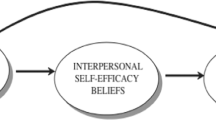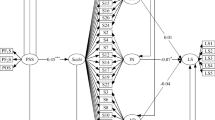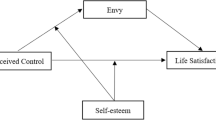Abstract
The psychological characteristic of shyness is negatively connected to life satisfaction. In this paper, we examined the mediating effect of core self-evaluation and the moderating effect of meaning in life on the relationship between shyness and individual life satisfaction among Chinese college students. A sample of 836 college students participated in this study and completed questionnaires regarding shyness, core self-evaluation, meaning in life, and life satisfaction. Mediation analysis indicated that core self-evaluation fully mediated the link between shyness and college students’ life satisfaction. The results of moderated mediation showed that college students’ perceived meaning in life moderated the associations between core self-evaluation and college students’ life satisfaction. For college students who endorsed a higher level of meaning in life, the association between core self-evaluation and life satisfaction is stronger compared to students who endorsed a lower level of meaning in life. The findings, theoretical contributions, and practical implications of the present paper are also discussed.



Similar content being viewed by others
References
Byrne, B. J. (1994). Bullies and victims in a school setting with reference to some Dublin schools. The Irish Journal of Psychology, 15(4), 574–586.
Chang, B. R., Bai, B. Y., & Zhong, N. (2017). Effect of negotiable fate on subjective well-being: The mediating role of meaning in life. Chinese Journal of Clinical Psychology, 25(4), 724–726 730.
Cheek, J. M., & Buss, A. H. (1981). Shyness and sociability. Journal of Personality and Social Psychology, 41(2), 330–339.
Chen, Q. (2019). Intervention of narrative group counseling on higher vocational college students’ core self-evaluation. China Journal of Health Psychology, 27(3), 385–389.
Coplan, R. J., & Rubin, K. H. (2010). Social withdrawal and shyness in childhood: History, theories, definitions, and assessments. In K. H. Rubin & R. J. Coplan (Eds.), The development of shyness and social withdrawal (pp. 3–20). New York: Guilford Press.
Deng, L. Y. , Li, B. L, & Zhao, X. Y. (2016). The effect of music therapy on shy adolescents and intervention mechanism. Psychology: Techniques and Applications, 4(11), 663–668.
Diener, E. (2000). Subjective well-being: The science of happiness and a proposal for a national index. American Psychologist, 55, 34–43.
Diener, E., & Diener, M. (1995). Cross-cultural correlates of life satisfaction and self-esteem. Journal of Personality and Social Psychology, 68, 653–663.
Diener, E., Emmons, R. A., Larsen, R. J., & Griffin, S. (1985). The satisfaction with life scale. Journal of Personality Assessment, 49(1), 71–75.
Du, J. Z., Zhang, X., & Zhao, Y. (2012). Reliability,validation and construct confirmatory of core self-evaluations scale. Psychological Research, 5(3), 54–60.
Erol, M. (2017). Adolescent life satisfaction before young adulthood: The role of "shyness" and "self-efficacy". Türk Psikiyatri Dergisi, 28(2), 95–103.
Gao, F. Q., Ren, Y. Q., Xu, J., & Han, L. (2016). Shyness and life satisfaction: Multiple mediating role of security and self-control. Chinese Journal of Clinical Psychology, 24(3), 547–549.
Gu, C. H., & Zhang, W. X. (2003). A survey on the relations of the bullying problem among primary schoolchildren to their personality. Acta Psychologica Sinica, 14(2), 101–105.
Han, L., Gao, F. Q., & He, J. B. (2011). The relationships between personality and shyness: Mediation and moderation effects. Journal of Psychological Science, 34(4), 889–893.
Hayes, A. F. (2013). Introduction to mediation, moderation, and conditional process analysis: A regression-based approach. Journal of Educational Measurement, 51(3), 335–337.
Henderson, L., & Zimbardo, P. G. (1999). Shyness. In Schmidt., L. A., Schulkin., J. (Eds). Extreme fear and shyness: Origins and outcomes (pp. 294–305). New York: Oxford University Press.
Hertel, G., Schroer, J., Batinic, B., & Naumann, S. (2008). Do shy people prefer to send e-mail? Personality effects on communication media preferences in threatening and nonthreatening situations. Social Psychology, 39(4), 231–243.
Hong, W., Liu, R. D., Oei, T. P., Zhen, R., Jiang, S., & Sheng, X. (2019). The mediating and moderating roles of social anxiety and relatedness needs satisfaction on the relationship between shyness and problematic mobile phone use among adolescents. Computers in Human Behavior, 93, 301–308.
Hoyle, R. H. (2012). Handbook of structural equation modeling. New York: Guilford Press.
Huang, H., & Leung, L. (2009). Instant messaging addiction among teenagers in China: Shyness, alienation, and academic performance decrement. CyberPsychology and Behavior, 12(6), 675–679.
Jiang, Z., & Jiang, X. (2015). Core self-evaluation and life satisfaction: The person-environment fit perspective. Personality and Individual Differences, 75, 68–73.
Judge, T. A., Erez, A., & Bono, J. E. (1998). The power of being positive: The relation between positive self-concept and job performance. Human Performance, 11(2–3), 167–187.
Judge, T. A., Erez, A., Bono, J. E., & Thoresen, C. J. (2003). The core self-evaluations scale: Development of a measure. Personnel Psychology, 56(2), 303–331.
Kline, R. B. (2011). Principles and practices of structural equation modeling. New York: Guilford.
Koivumaa-Honkanen, H., Honkanen, R., Viinamäki, H., Heikkilä, K., Kaprio, J., & Koskenvuo, M. (2001). Life satisfaction and suicide: A 20-year follow-up study. American Journal of Psychiatry, 158(3), 433–439.
Kong, F., & You, X. (2013). Loneliness and self-esteem as mediators between social support and life satisfaction in late adolescence. Social Indicators Research, 110(1), 271–279.
Kong, F., Wang, X., & Zhao, J. (2014). Dispositional mindfulness and life satisfaction: The role of core self-evaluations. Personality and Individual Differences, 56, 165–169.
Kong, F., Ding, K., Yang, Z., Dang, X., Hu, S., Song, Y., & Liu, J. (2015a). Examining gray matter structures associated with individual differences in global life satisfaction in a large sample of young adults. Social Cognitive and Affective Neuroscience, 10(7), 952–960.
Kong, F., Hu, S., Wang, X., Song, Y., & Liu, J. (2015b). Neural correlates of the happy life: The amplitude of spontaneous low frequency fluctuations predicts subjective well-being. Neuroimage, 107, 136–145.
Kong, F., Wang, X., Hu, S., & Liu, J. (2015c). Neural correlates of psychological resilience and their relation to life satisfaction in a sample of healthy young adults. Neuroimage, 123, 165–172.
Kong, F., Ma, X., You, X., & Xiang, Y. (2018). The resilient brain: Psychological resilience mediates the effect of amplitude of low-frequency fluctuations in orbitofrontal cortex on subjective well-being in young healthy adults. Social Cognitive and Affective Neuroscience, 13(7), 755–763.
Kong, F., Zhao, J., You, X., & Xiang, Y. (2019). Gratitude and the brain: Trait gratitude mediates the association between structural variations in the medial prefrontal cortex and life satisfaction. Emotion.
Li, J. B., & Nie, Y. G. (2010). Reflection and prospect of core self-evaluation research. Advances in Psychological Science, 18(12), 1848–1857.
Li, C. N., Dang, J. N., He, S. S., & Li, H. M. (2013). Shyness and loneliness: The multiple mediating effects of self-efficacy. Acta Psychologica Sinica, 45(11), 1251–1260.
Liao, H. Y., Zhong, Y. H., Wang, R. R, & Tang, H. (2016). Mobile phone addiction, self-esteem, shyness and interpersonal communication disturbance. Chinese Journal of Clinical Psychology, 24(5), 852–855.
Lü, C. F., & Zhou, Y. H. (2019). Relationship between gratitude and problem behavior in street children: The mediating role of core self-evaluations and social support. Chinese Journal of Clinical Psychology, 27(2), 406–409 413.
Luo, W. W., Fang, J., & Sun, Y. W. (2018). The relationship between cyber victimization and suicide ideation of university students: The moderator effect of meaning in life. Psychology: Techniques and Applications, 6(4), 211–217.
Manzi, C., Roccato, M., & Russo, S. (2015). Meaning buffers right-wing authoritarian responses to societal threat via the mediation of loss of perceived control. Personality and Individual Differences, 83, 117–121.
Muthén, L. K., & Muthén, B. O. (2015). Mplus statistical analysis with latent variables (version 7.4) [statistical software]. Los Angeles, CA: Author.
Mynard, H., & Joseph, S. (1997). Bully/victim problems and their association with Eysenck’s personality dimensions in 8 to 13 year-olds. British Journal of Educational Psychology, 67, 51–54.
Nell, W. (2014). Exploring the relationship between religious fundamentalism, life satisfaction, and meaning in life. Journal of Psychology in Africa, 24(2), 159–166.
Podsakoff, P. M., Mackenzie, S. B., Lee, J. Y., & Podsakoff, N. P. (2003). Common method biases in behavioral research: A critical review of the literature and recommended remedies. Journal of Applied Psychology, 88(5), 879–903.
Ran, G., Zhang, Q., & Huang, H. (2018). Behavioral inhibition system and self-esteem as mediators between shyness and social anxiety. Psychiatry Research, 270, 568–573.
Ren, X. Y. (2017). The influence of peer relationship of college students on internet addiction: The mediating effect of core self-evaluations. Psychology: Techniques and Applications, 5(9), 521–529.
Ren, Y. Q., Gao, F. Q., & Han, L. (2018). Shyness and being bullied: The chain mediating effect of social avoidance and being accepted by others. Psychological Exploration, 38(2), 154–158.
Rowsell, H. C., & Coplan, R. J. (2013). Exploring links between shyness, romantic relationship quality, and well-being. Canadian Journal of Behavioural Science / Revue Canadienne Des Sciences Du Comportement, 45(4), 287–295.
Shang, S. J., Bai, B. Y., & Zhong, N. (2016). Family social class and meaning in life: Mediating of basic psychological need satisfaction. Chinese Journal of Clinical Psychology, 24(6), 1108–1111.
Sheldon, K. M., & Elliot, A. J. (1999). Goal striving, need satisfaction, and longitudinal well-being: The self-concordance model. Journal of Personality and Social Psychology, 76(3), 482–497.
Slee, P. T., & Rigby, K. (1993). The relationship of Eysenck’s personality factors and self-esteem to bully-victim behavior in Australian schoolboys. Personality and Individual Differences, 14(2), 371–373.
Song, G., Kong, F., & Jin, W. (2013). Mediating effects of core self-evaluations on the relationship between social support and life satisfaction. Social Indicators Research, 114(3), 1161–1169.
Steger, M. F., Frazier, P., Oishi, S., & Kaler, M. (2006). The meaning in life questionnaire: Assessing the presence of and search for meaning in life. Journal of Counseling Psychology, 53(1), 80–93.
Steger, M. F., Oishi, S., & Kashdan, T. B. (2009). Meaning in life across the life span: Levels and correlates of meaning in life from emerging adulthood to older adulthood. Journal of Positive Psychology, 4(1), 43–52.
Sun, Y. Q. (2010). The eye movement studies of the feature of facial cognitive task performed by the shy undergraduates (Unpublished master’s thesis). Shandong Normal University, Shandong.
Sun, R. C. F., & Shek, D. T. L. (2012). Positive youth development, life satisfaction and problem behaviour among Chinese adolescents in HongKong: A replication. Social Indicators Research, 105(3), 541–559.
Sun, P., Wang, S., & Kong, F. (2014). Core self-evaluations as mediator and moderator of the relationship between emotional intelligence and life satisfaction. Social Indicators Research, 118(1), 173–180.
Tian, Y., Si, Y., Meng, W., Bian, Y., Han, P., Hu, J., … Gao, F. (2019). Mediating factors of the association between shyness and generalized pathological internet use in Chinese university students. International Journal of Mental Health and Addiction, 17(3), 555–572.
Van Tongeren, D. R., & Green, J. D. (2010). Combating meaninglessness: On the automatic defense of meaning. Personality and Social Psychology Bulletin, 36(10), 1372–1384.
Wang, M. C., & Dai, X. Y. (2008). Chinese meaning in life questionnaire revised in college students and its reliability and validity test. Chinese Journal of Clinical Psychology, 16(5), 459–461.
Wang, J., Zhao, J., & Wang, Y. (2014). Self-efficacy mediates the association between shyness and subjective well-being: The case of Chinese college students. Social Indicators Research, 119(1), 341–351.
Wen, Z., Kit-Tai, H., & Herbert, W. (2004). Structural equation model testing: Cutoff criteria for goodness of fit indices and chi-square test. Acta Psychologica Sinica, 36(2), 186–194.
Xiang, B. H., Ren, L. J., & Liu, J. S. (2018). Psychometric properties of cheek and buss shyness scale in Chinese college students. Chinese Journal of Clinical Psychology, 26(2), 268–271.
Xiong, C. Q., & Xu, Y. L. (2009). Reliability and validity of the satisfaction with life scale for Chinese demos. China Journal of Health Psychology, 17(8), 948–949.
Yan, X., Su, J., Zhu, X., & He, D. (2013). Loneliness and subjective happiness as mediators of the effects of core self-evaluations on life satisfaction among Chinese college students. Social Indicators Research, 114(2), 757–766.
Zhang, J. J. (2018). Intervention effect of group counseling on improving meaning in life of police college students. Occupational Health, 34(8), 1110–1113.
Zhang, R. W., & Li, D. (2018). How to experience a meaningful life: Based on the integration of theoretical models on meaning in life. Advances in Psychological Science, 26(4), 744–760.
Zhang, F., Zhang, C., & Hudson, J. (2018). Housing conditions and life satisfaction in urban China. Cities, 81, 35–44.
Zhao, J., Kong, F., & Wang, Y. (2012). Self-esteem and humor style as mediators of the effects of shyness on loneliness among Chinese college students. Personality and Individual Differences, 52(6), 686–690.
Zhao, J., Kong, F., & Wang, Y. (2013). Shyness and subjective well-being: The role of emotional intelligence and social support. Social Indicators Research, 114(3), 891–900.
Zhao, D., Wang, Y. H., Li, J. J., & Wang, L. (2014). Coping style as mediator on the relationship between meaning in life and life satisfaction in graduate students. China Journal of Health Psychology, 22(11), 1733–1735.
Zhao, X., Feng, Z. N., Shang, P. F., & Jin, G. (2016). Shyness and emotion regulation strategies: The mediating role of emotion regulation self-efficacy. Chinese Journal of Clinical Psychology, 24(4), 717–720.
Zhao, J., Song, F., Chen, Q., Li, M., Wang, Y., & Kong, F. (2018). Linking shyness to loneliness in Chinese adolescents: The mediating role of core self-evaluation and social support. Personality and Individual Differences, 125, 140–144.
Zhao, J., Tan, M., Gao, L., & Wang, Y. (2019). Shyness and loneliness: Contributions of emotional intelligence and social support. Current Psychology, 38(2), 556–562.
Zhong, W. F., Chen, R. L., Hou, W., & Li, X. Y. (2019). The effect of meaning in life on motivation to abstain from drugs: The mediating role of satisfaction with life and the moderation role of resilience. China Journal of Health Psychology, 27(4), 502–506.
Funding
This research was funded by National Natural Science Foundation of China(31600909), Jiangxi Provincial Social Science Planning Project (18JY09; 17JY07), Jiangxi Provincial Education Science Planning Project(18ZD010, 19YB019) and Jiangxi Provincial Key Research Base for Colleges’ Humanities and Social Sciences (JD17078, JD1550).
Author information
Authors and Affiliations
Corresponding author
Ethics declarations
Conflict of Interests
This research was conducted in the absence of any commercial or financial relationships that could be construed as a potential conflict of interest.
Additional information
Publisher’s Note
Springer Nature remains neutral with regard to jurisdictional claims in published maps and institutional affiliations.
Rights and permissions
About this article
Cite this article
Ye, B., Li, L., Ma, TL. et al. The Effect of shyness on life satisfaction among Chinese college students: a moderated mediation model. Curr Psychol 41, 165–173 (2022). https://doi.org/10.1007/s12144-019-00562-w
Published:
Issue Date:
DOI: https://doi.org/10.1007/s12144-019-00562-w




